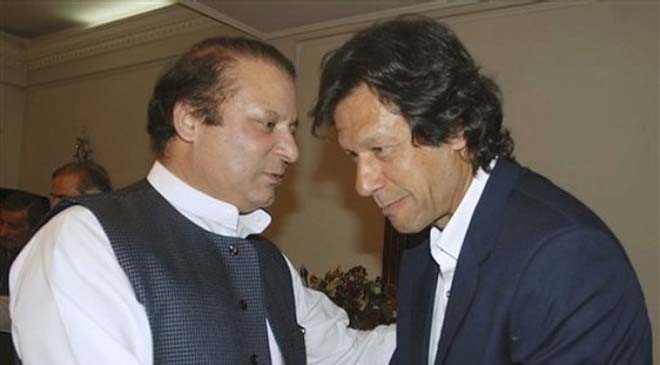
Entering a cul de sac without an exit strategy

Divested of ideological content, Pakistani politics has been overtaken by opportunism of sorts. All the political parties have come to pursue the right-wing agenda, differing only in the amount of emphasis they lay on being right.
Professor Waseem refers to such politics as "statist", by which he implies a subscription to centrist policies mostly orchestrated by the executive.
From the outset, the liberal-left did not have a level playing field and the ultra-left or the left was squeezed out. The way Mian Iftikhar-ud-Din (1907-1962) was unceremoniously removed from the office when, he, as the Minister for Rehabilitation of Refugees, proposed radical reforms in Punjab, which led to a backlash from the feudal leadership -- spearheaded by Iftikhar Hussain Khan Mamdot.
Not only was Iftikhar-ud-Din removed from office, he was also expelled from Muslim League in 1951.
Other members of the same camp were compelled to operate from the political margins, particularly after the signing of the defence pacts with America in 1954. This made the noose around the leftists tighter. They were forced to focus on their physical survival rather than on politics.
The Marxist Historian Sibte Hassan remained underground after Independence; Sajjad Zaheer, not finding the circumstances conducive for the politics of left, bade farewell to Pakistan and went back to India; and Faiz Ahmad Faiz, Safdar Mir and Mazhar Ali Khan got a share of the raw deal at the hands of the statist elements. Some had to go into exile like Prof. Amin Mughal, who has been living in London since 1981, while many of them confined their political activism to journalism only.
Journalism, therefore, deserves kudos for providing sustenance to such trends for many years.
Eventually, after realising that the liberal-left could not operate on its own, and particularly after Iftikhar-ud-Din’s Azad Pakistan Party failed to make any impact, they devised a strategy of aligning with anti-statist and ethno-linguistic groups, such as the National Awami Party (NAP).
The NAP was founded in 1957 in Dhaka and it remained active until 1967.
Such alliances managed to stand the vicissitudes of time under the leadership of people like Abdul Hamid Khan Bhashani (1880-1976) and Ghaus Bakhsh Bizenjo (1917-1989) but, after the independence of East Pakistan, the statist proclivities not only acquired strength, despite charismatic and progressive overtures of Zulfikar Ali Bhutto, but gave rise to a reactionary ring. The anti-Ahmedi movement of 1974 and then Nizam-i-Mustafa movement in 1977 were clear manifestations of the dwindling presence of the liberal-left ideology and of right-wing factions moving to the centre stage of Pakistani politics.
It goes without saying that Ziaul Haq extended as much facility to religio-political ideologues as he could, to get political mileage for prolonging of his rule. The process of Islamisation and Afghan jihad gave rise to a new political culture, where violence in the name of religion was legitimised. Benazir Bhutto was maligned whenever she made liberal moves.
So, with the liberal-left rendered completely ineffective as a political force, rightist parties held complete sway.
But, political dialectics started gnawing them from within, and a sharp-edged wedge of sectarianism began to drive them apart. The right-wing person came to be characterised as Punjabi, Sunni and male, lending support to centrist-statist tendencies.
Both the Pakistan Muslim League-Nawaz and Pakistan Tehreek-i-Insaf subscribe to the same ideology; the difference is only in the ways and means they scramble for power.
What is ironic, in the current political scenario, is the appropriation of leftist symbolism by the right-wing political parties, particularly the PML-N. Not only has the party distanced itself from Zia legacy, it has also shown a bit of deference to Z.A. Bhutto, despite his nationalisation of their industries in 1970s. Even the poetry of once loathed figures, like Faiz, Ahmed Fraz and Habib Jalib, have found a niche in the PML-N’s political parlance -- once upon a time, it struck alliances with Jaamat-e-Islami and Sipah-e-Sahaba, and even Riaz Hashmat Janjua was given a ministerial position in the Punjab cabinet of the Pakistan Muslim League in 1990s, but now a volte face can clearly be seen in its political priorities.
The PML-N is a typical right-wing party with no agenda of any social reform. And the PTI is no different.
Manifestoes and party programmes no longer matter in elections. Personal charisma has become more important than any socio-political agenda to which parties subscribe. Liking Imran Khan at the expense of Nawaz Sharif, or vice versa, hardly makes any political sense. Of course, Imran’s charisma made waves before he entered a not-so-holy alliance with Tahirul Qadri, who does not have any stakes in Pakistani politics. Thus Khan’s entire political career is at stake.
The lesson worth learning is that a political party must never enter into an alliance with a religious party, Pakistan Awami Tehrik being the case in point. It is electorally catastrophic for a party with a lot of promise (likethe PTI) to align with some faction without electoral ambitions. The politics of long march or dharna (sit-in) with preposterous pre-conditions, such as the resignation of the prime minister, is akin to entering a cul de sac without an exit strategy. This is absolutely lamentable as well as ludicrous.
The signs of an implosion from within the ranks of the PTI have become obvious. Now it needs some intense soul-searching.
Inqilab (revolution), as used by Tahirul Qadri, is a word of which right-wing parties were once intolerant. Revolution was the aim and agenda of the left. Now, Qadri is using it to the amusement of many. Probably, he does not know the disasters that all the revolutions wreaked in their wake. Massive bloodshed, and the enormity of the socio-cultural upheaval means that a revolution is something a country like Pakistan can hardly bear with. Qadri should talk about something more pragmatic and sensible.